
- Home
- Artisan
- Albert Cleveland (13)
- Angus Ahiyite (21)
- Bea Johnson (10)
- Bennie Ration (11)
- Diane Lonjose (12)
- Doris Smallcanyon (21)
- Eldred Martinez (20)
- Handmade (10)
- Herbert Ration (17)
- Larry Moses Begay (20)
- Lee Charley (25)
- Navajo (40)
- Not Signed (81)
- Paula Leekity (16)
- Tamara Pinto (23)
- Unknown (83)
- Unmarked (29)
- Unsigned (36)
- Yes (12)
- Zuni (19)
- ... (5804)
- Culture
- Jewelry Type
- Bracelets (13)
- Brooch (50)
- Brooch / Pin (13)
- Brooch Pin (46)
- Necklace (13)
- Necklaces (58)
- Pendant (22)
- Pendant / Pin (29)
- Pendant Pin (13)
- Pendants (408)
- Pendants / Pins (30)
- Pin (121)
- Pin / Brooch (22)
- Pin / Pendant (161)
- Pin Brooch (25)
- Pin Pendant (32)
- Pin, Brooch (26)
- Pins (1567)
- Pins Brooches (26)
- Pins Pendants (12)
- ... (3636)
- Metal
- Origin
- Setting Style
Native American Pojoaque Pueblo Sgraffito Seed Pot Redware by Puuya Pin 8 1/2 D
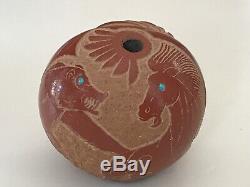
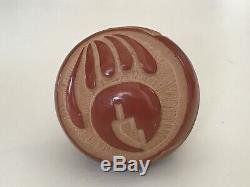
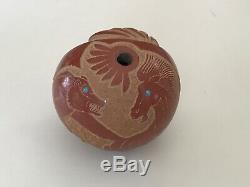
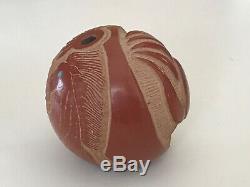
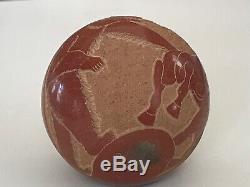
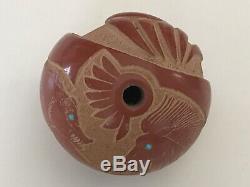
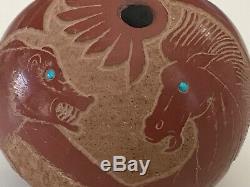


This Native American Pojoaque Pueblo Sgraffito Seed Pot Redware Turquoise Beads by Puuaya Pin depicts a wild horse and a bear, also mountains and a bear claw. There are two Turquoise beads in the piece. It measures 8 1/2 diameter.
In 1541, Spanish Viceroy Mendoza put allied Aztec warriors on horses to better lead their tribesmen in the Mixton War of Central Mexico. This appears to have been the first time that horses were officially given to Native Americans. These first American horsemen were seen to rub themselves with horse sweat, so that they might acquire the magic of the "big dog".
But the early relationship between Native Americans and horses was not always mutually beneficial. Some tribes, especially the Apache, acquired a taste for roasted horse meat.
After 1680, the Pueblo tribes forced the Spanish out of New Mexico. Many horses were left behind. The Pueblo learned to ride well but didn't live by the horse. They mainly valued the horse as food and as an item to trade with the Plains tribes for jerked buffalo meat and robes.
Horses and horsemanship gradually spread from tribe to tribe until the Native Americans of the Plains became the great mounted buffalo hunters of the American West. The alliance of Native Americans and the Spanish horse gave them great mobility and changed their way of life. Tribes with horses were dominant over other tribes who relied on moving their camps on foot. The Plains people were great mounted buffalo hunters. This horse advantage allowed them to trade bison meat and hides for glass beads, metal tools, cloth, and guns.
Among the Pueblo tribes, bears are considered one of the six directional guardians, associated with the west and the color blue. The Zunis ascribe healing powers to bears and carve stone bear fetishes to protect them and bring them luck. A bear's claw was one of the talismans frequently included in medicine bundles, and warriors in some tribes wore necklaces of bear claws to bring them power and strength. There were also many taboos regarding bears in different Native American tribes-- the use of hunting seasons (to avoid killing mother bears with their cubs) was the most common, but in some tribes, it was considered disrespectful and dangerous to insult bears, step on their scat, or even utter their names outside of certain ritual contexts. The item "Native American Pojoaque Pueblo Sgraffito Seed Pot Redware by Puuya Pin 8 1/2 D" is in sale since Friday, February 21, 2020.
This item is in the category "Collectibles\Cultures & Ethnicities\Native American\ US\1935-Now\Pottery". The seller is "aurummeum" and is located in Albuquerque, New Mexico. This item can be shipped worldwide.
- Provenance: Ownership History Not Available
- Tribal Affiliation: pojoaque
- Modified Item: No
- Featured Refinements: Native American Pottery
- Country/Region of Manufacture: United States
- Handmade: Yes
- Artisan: Puuaya Pin

